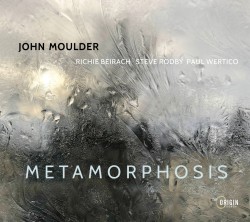MUSIC REVIEW BY Jack Bowers, All About Jazz
As approximately fifty of the sixty-eight minutes on Chicago-based guitarist John Moulder's new CD, Metamorphosis, are devoted to the seven-part "Metamorphosis Suite," that seems an appropriate point at which to start any appraisal of its contents and purpose. First and foremost, it is clear that considerable thought was given to mapping the structure of the suite, and that Moulder's quartet came well-prepared to accept and conform to his frame of mind. Whether the end result is worthy of approval is for the listener to decide. What can be said is that the suite is more earnest than effervescent, more cerebral than sunny, more leisurely than light-hearted, and that everyone does the best he can to make it meaningful and engaging.
Three of the suite's main themes—"Metamorphosis," "Into the Dazzling Darkness" and "Morning Angels"—are preceded by brief introductions, the first by Moulder, the others by pianist Richie Beirach. The last movement, "Once in a Dark Night," includes no introduction but follows the same self-possessed and leisurely pattern as "Darkness" and "Morning Angels." Only "Metamorphosis" deviates from the norm with some animated guitar licks from Moulder before it lapses into a more somnolent vein to welcome Beirach's meditative piano. The overall mood, it must be said, is more cheerless than changeable, leaving the listener to wonder what the transformation may epitomize.
As if freed from the suite's thematic constraints, the quartet swings out with gusto on Moulder's "Sarum," showing there is more in its repertoire than contemplation and soul-searching. Everyone shines on that cheerful theme, from Moulder and Beirach to bassist Steve Rodby and drummer Paul Wertico. Alas, that is the only number on the album that lights any sort of fire, if one discounts the opening "Game Changer," which tries to generate some spark but ends up submerged beneath its own weight. After "Sarum," the gloominess returns on "Magical Space," and is only partially redressed by the more upbeat "Soliloquy," which closes the session. Yes, Moulder had a game plan, and yes, his quartet carried it out to the letter—but less meditation and more music of the order of "Sarum" would have been warmly received in these quarters.
Three of the suite's main themes—"Metamorphosis," "Into the Dazzling Darkness" and "Morning Angels"—are preceded by brief introductions, the first by Moulder, the others by pianist Richie Beirach. The last movement, "Once in a Dark Night," includes no introduction but follows the same self-possessed and leisurely pattern as "Darkness" and "Morning Angels." Only "Metamorphosis" deviates from the norm with some animated guitar licks from Moulder before it lapses into a more somnolent vein to welcome Beirach's meditative piano. The overall mood, it must be said, is more cheerless than changeable, leaving the listener to wonder what the transformation may epitomize.
As if freed from the suite's thematic constraints, the quartet swings out with gusto on Moulder's "Sarum," showing there is more in its repertoire than contemplation and soul-searching. Everyone shines on that cheerful theme, from Moulder and Beirach to bassist Steve Rodby and drummer Paul Wertico. Alas, that is the only number on the album that lights any sort of fire, if one discounts the opening "Game Changer," which tries to generate some spark but ends up submerged beneath its own weight. After "Sarum," the gloominess returns on "Magical Space," and is only partially redressed by the more upbeat "Soliloquy," which closes the session. Yes, Moulder had a game plan, and yes, his quartet carried it out to the letter—but less meditation and more music of the order of "Sarum" would have been warmly received in these quarters.
Soundclips
Other Reviews of
"Metamorphosis":
Take Effect by Tom Haugen
Midwest Record by Chris Spector
